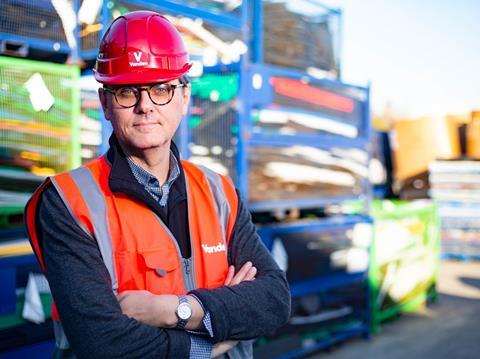
David Wilson, UK Managing Director at Vanden Recycling discusses why we should all regard scrap as a valuable material.
Your elevator pitch: introduce and sell us your company in no more than 280 characters.
Vanden Recycling exist to make an impact on plastic waste. We view plastic as a valuable commodity that can become high-quality feedstock, building sustainable supply chains. We work closely with suppliers to find a smart solution for their plastic supply and recycling needs.
Where are your company’s locations? Are there any specific challenges or advantages relating to your geographical location that you could tell us about?
We have offices in Australia, Hong Kong, Finland, Turkey, UK and Dubai. We have a dedicated plastic recycling facility in Cambridgeshire that reprocesses 30 metric tonnes of plastic scrap, offcuts, skeletal waste and redundant or end of life stock, every day.
Tell us a surprising fact about the market you work in.
The plastics manufacturing industry employs 182,000 people in the UK alone and is the third largest manufacturing sector in the country.
At Packaging Europe we like to watch trends and areas of innovation as they evolve. Can you tell us something we might not be aware of that is driving technology in your sphere?
With the rise of the circular economy we’ll see incentives for inclusion of recycled content. The petrochemical industry has operated on a linear model with little involvement with what happens to their products. With CE they can’t maintain that stance.
Oil is a powerhouse and their involvement will accelerate recycling.
What would you say is the biggest common misconception that you encounter in your business?
Thinking that the basics of keeping material clean & segregated don’t matter. These elements maximise the value of scrap material and are instrumental in securing materials re-entry into the supply chain.
If the wider packaging industry could be transformed in some way, what kind of change would you like to see?
The ever-increasing collaboration between packaging designers and recyclers. This would ensure that mixed polymer packaging is reduced and the use of unrecyclable plastic, like Black PET, is reduced, if not eliminated.
…and how do you envisage your company changing the industry in the coming years?
By making the supply chain truly circular. We want businesses that produce plastic scrap to integrate the recovery of this scrap as part of their everyday operations, and not an afterthought.
To view this scrap as a valuable material, treating it as such when it comes to recovery, storage and handling, as well as acknowledging their roles and responsibility that they play in contributing to sustainable supply chains and the circular economy.
Using a waste manager isn’t enough – we all need to be accountable for knowing where our plastic scrap is ending up and how it is being treated.













